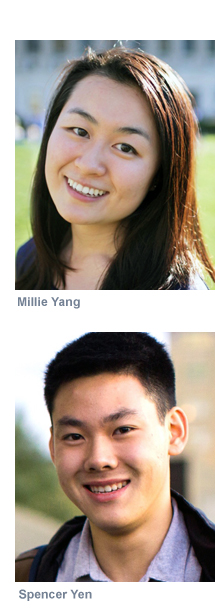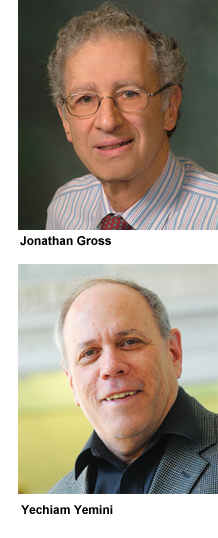Month: March 2017
Undergrads Millie Yang and Spencer Yen earn engineering fellowships from KPCB

Two Columbia computer science undergrads, Millie Yang and Spencer Yen, have been selected to participate in the Kleiner Perkins Caufield & Byers (KPCB) Fellows Program, a summer program that gives US college students the chance to intern inside Silicon Valley tech companies while being mentored by executives within those companies. The program also entails KPCB-arranged events that include talks by leading individuals from the tech industry and opportunities to meet and network with other fellows and KPCB partners.
Yang and Yen, among 54 students selected from 2000 applicants, will intern at DoorDash, a restaurant delivery service recently in the news for testing delivery robots.
Yang is a junior currently pursuing the computer science Applications Track. She came late to computer science, taking her first class in the subject her first year at Columbia. “I had thought that I would be disadvantaged, but the computer science community at Columbia welcomed me with open arms, and strongly encouraged me to try out computer science classes.” For her part, she embraces technology, and sees it as a way to empower underprivileged communities; it’s a lesson learned first hand after spending a summer volunteering in Peru. “I was astonished to find WiFi at a broadband greater than I had previously used. Watching the local Peruvians use their phones and second-hand tablets to check market prices and communicate in businesses, I realized technology is making a revolutionary impact and leveling the playing field in developing countries.”
For her, DoorDash stood out because it is a start-up facing rapid growth and is striving to revolutionize the delivery industry. The company’s mission statement of “streamlining the world’s cities” echoes her personal experiences. “Born in New York, and raised in Hong Kong and London, I embrace my multicultural background as a crucial part of my identity. My interviewers and recruiters at DoorDash have demonstrated their strong support of the company’s goals, and it made me feel very much at home.”
Yen is the rare first-year student to be selected as a KPCB fellow. Coming from the Silicon Valley (where he was a user of DoorDash), he is imbued with the self-starter ethos endemic to the area. He taught himself—with an assist from YouTube—how to code, and since early high school has been creating iPhone games and apps. “I love that I can come up with an idea and just make it, and seeing people enjoy using something I created makes it all the more rewarding.” Gaining confidence over time in his coding skills, he took the initiative, reaching out to companies in the area for summer work. Two summers ago, he finagled—via cold-emailing—an opportunity to work alongside Mark Pincus at Pincus’s Superlabs incubator where the other hires were all recent grads from MIT. “I learned a lot about how some of the best entrepreneurs and engineers in the industry operate. It was a great experience to see how they thought about design and product, and how they approached writing code.”
While he hesitates to call himself an entrepreneur—he is still in his first year at college after all—the early signs are all there, and he cops to “working on projects.” A startup last year made it into the Almaworks Startup Accelerator program before he and the others involved decided to go in another direction. While not actively looking to start a company, Yen is of course open to the possibility if the right idea comes along.
Neither Yang nor Yen lacked options for this summer, but both were looking for something more than just a job and work experience. The KPCB program came highly recommended; a former fellow from Columbia described the program to Yen as phenomenal. “It’s all about the other fellows in the program and the incredible people you meet through the program,” says Yen. “You learn a lot just by being around ambitious and talented people.”
Yang, who is studying economics in addition to computer science, would agree with that assessment. “KPCB’s Fellowship Program will allow me to be exposed to the venture capital network and educate myself on how startups succeed in the Silicon Valley.”
– Linda Crane
Posted 3/27/2017
Startup cofounded by undergrad Mathew Pregasen renders math script from plain English
His startup Parsegon also has an education focus, explains Pregasen in this Q&A by The Columbia Lion, helping students learn the language of math while enabling interactive math in the classroom and online.
Universities dive into VR research
Computer Science Department establishes Jonathan Gross Prizes to recognize top CS graduates
![]()
 Beginning this spring, five graduating computer science students—one senior from each of the four undergraduate schools and one student from the master’s program—will be selected to receive the Jonathan Gross Prize. The prize honors students who graduate at the top of their class with the highest overall GPA and a track record of promising innovative contributions to computer science. Students will be recommended for the prize by the department chair, with final recipients selected by a majority vote of the faculty.
Beginning this spring, five graduating computer science students—one senior from each of the four undergraduate schools and one student from the master’s program—will be selected to receive the Jonathan Gross Prize. The prize honors students who graduate at the top of their class with the highest overall GPA and a track record of promising innovative contributions to computer science. Students will be recommended for the prize by the department chair, with final recipients selected by a majority vote of the faculty.
The prize is being made possible by an endowment set up by Yechiam (Y.Y.) Yemini, who for 31 years until his retirement in 2011 was a professor of computer science at Columbia. “This university has amazing students, and they deserve to have their academic accomplishments recognized by faculty and their fellow students; in recognizing them, we inspire a culture of excellence.”
The prize recognizes students while honoring Jonathan L. Gross for his 47 years teaching at Columbia, first in the Mathematical Statistics Department and then as a cofounder of the Computer Science Department.
“Jonathan Gross built and led the CS department education program for several decades,” says Yemini. “His continuing contributions to developing CS education over several decades defined his role as the ‘father’ of CS education at Columbia.”
Though primarily a mathematician, Gross had an early interest in computers and believed computing was for everybody. He was Acting Chair of Mathematical Statistics when SEAS committed funds in 1978-1979 to found the Computer Science Department. Gross’s role in starting the new department was fundamental; among his first initiatives, Gross merged the computer science courses that were concurrently being offered by both the Mathematical Statistics and the Electrical Engineering departments. As the new Computer Science Department grew from just a few professors in its first year—it now numbers almost 50 professors and five teaching-oriented faculty—Gross organized department-wide efforts to keep the academic curriculum at the educational forefront.
“I am deeply appreciative that my dear friend YY has honored me by associating my name with this wonderful award he has endowed,” says Gross, now professor emeritus. “It is a wonderful way to recognize the academic excellence of our students.”
For his part, Yemini says he feels fortunate to have the opportunity to help ensure that the legacy of excellence begun by Gross continues. Yemini’s Columbia research lab pioneered a range of seminal network technologies, from autonomic self-managing networks, to microeconomic network control, to high-speed switches and (what became two decades later) software-defined networks. The coauthor of over 100 refereed publications and a holder of 30 patents, Yemini is also a serial entrepreneur who cofounded five high-tech startups. Three of those startups grew out of technologies developed in his Columbia Lab and employ Columbia graduates. His most recent startup, Turbonomic.com (2009), just celebrated its 24th continuous quarter of record revenues growth, raising $50M investment to value the company at over $800M. Turbonomic’s R&D team includes scores of Columbia graduates in its NYC and Westchester offices.
Now professor emeritus and officially retired, Yemini continues to develop Turbonomic technologies while also teaching the popular Columbia Course “Principles of Innovation and Entrepreneurship (PIE)” and supporting philanthropic projects.
Julia Hirschberg, chair of the Computer Science Department, will announce and distribute the first Jonathan Gross Prizes this May at the graduation reception for computer science students. “This is a wonderful gift by a great emeritus faculty, YY Yemini, to honor another great emeritus, Jonathan Gross. The Department could not be more pleased.”
– Linda Crane
Posted 3/20/2017
Lights! Camera! Algorithms? Columbia Magazine features research of Eitan Grinspun
In creating Moana and other animated movies, artists at Walt Disney Animation Studios use techniques developed by Grinspun and his students to give characters lifelike hair that flows, bounces, and twists.
Awesome people: Kathy McKeown profiled in natural language processing blog
“Whenever a new topic becomes popular in NLP, we find out that Kathy worked on it ten years ago.”

